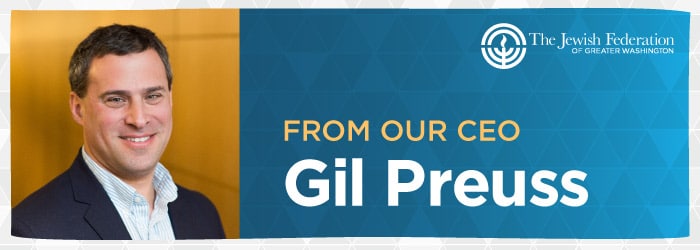-
28 March 2018

As we prepare to begin our Passover celebrations this evening, I am reminded of a quote by Rabbi Nachman of Breslov that feels especially pertinent today. “The Exodus from Egypt,” he said, “occurs in every human being, in every era, in every year and in every day.”
Few celebrations offer as many lessons and challenges as a Passover seder. We are told the Exodus occurs in everyone and every day, but what does that mean? We remember our history, but what do we highlight? In any history there are parts that resonate and parts that we seek to forget. What is the memory we seek to hold? What is the narrative we tell ourselves? We are told to welcome the stranger since we were strangers in the land of Egypt, but who are we responsible for? Are we responsible for welcoming all strangers – those from far-away lands, as well as those from our own community? How do we consider the needs of all? Where do we prioritize? Finally, we are reminded to celebrate freedom, but do we have a common understanding of what freedom means to us and others?
The seder presents a unique opportunity for multiple generations to gather and consider these and other important questions. It provides a particular historical context, Israelites leaving Egypt, and a particular framework, the seder, through which these issues and others are elevated and discussed. It is not surprising that my family’s seders have been the place for some of the most heated discussions and debates. I am confident that we are not alone in this. And because of this constant conversation, it is not surprising that the Passover seder has been one of the most celebrated, yet ever-changing traditions in Jewish practice. Just look at the number of Passover Haggadot out there seeking to answer the questions above in distinct ways!
By the very nature of asking why this night is different from all other nights, the seder also insists that our children’s voices are part of the conversation and instills in them the confidence needed to ask important questions. In Greater Washington, our children have the benefit of growing up in a Jewish community that is engaged, innovative and dynamic. More importantly, by encouraging our youngest guests to lead a significant portion of the seder, we remind them that we were not only slaves in Egypt but that we, collectively, must own the Jewish future. We recognize that no one group has all the answers and that our path forward needs all members of the community to ask questions and shape our future.
This responsibility of instilling confidence and ownership cannot be taken lightly and is among the many reasons why The Jewish Federation invests in Jewish education, identity-building and engagement opportunities for our children, teens and young adults. As we struggle with core issues facing our Jewish community and American society, we can take comfort in knowing that our traditions help build the capacity to address difficult questions that need to be confronted as we build our vision for a community of purpose and meaning. Through these traditions and practices as well as ongoing communal investments, we can sustain Rabbi Nachman of Breslov’s statement and ensure that we do live the Exodus from Egypt every day.
Wishing you and yours a Shabbat Shalom and a meaningful Passover celebration,
Gil
